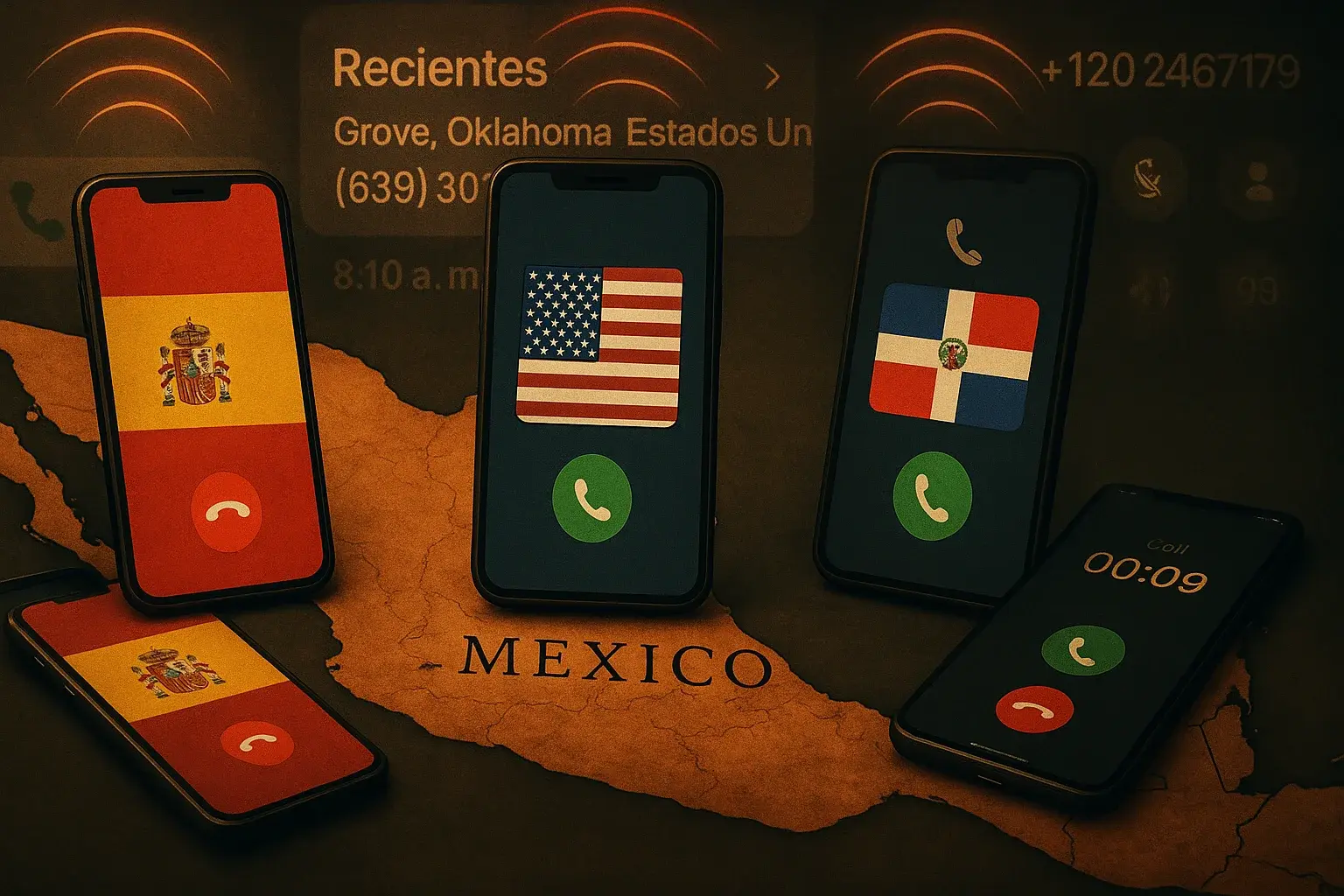Recently, an international fraud scheme has been rapidly expanding in Mexico, luring thousands of people through calls from UK phone numbers. Since the beginning of April 2025, numbers with the +44 prefix have started appearing on the mobile phones of Mexican users. Gradually, the scammers have shifted their strategy, now using numbers from Spain (+34), the United States (+1), and the Dominican Republic (+1 839).
The scam follows a highly structured pattern: it begins with a pre-recorded call, continues through WhatsApp messages, and ends in Telegram groups where the final part of the deception is carried out. This is not an isolated attempt or a random prank call. It’s an organized network using multiple channels to manipulate and defraud.
UK Phone Numbers Were Just the Beginning
The operation initially used UK numbers (+44), sending pre-recorded messages to people in Mexico with supposed offers for online jobs. But as these calls started going viral and public suspicion grew, the strategy evolved quickly. Now, the calls don’t just come from the UK. Scammers are using numbers from several countries, including:
-
Spain: +34 603 15 91 07, +34 612 461 719
-
United States: +1 (539) 304 0548 (Oklahoma)
-
Dominican Republic: +1 839 296 5875
One example, the Dominican Republic number, includes a recording that says: “Hello, I’m the MercadoLibre manager. Today’s task is about to begin. Connect to Telegram to get your task as soon as possible.”
These calls are directly tied to Telegram groups, where more than 13,000 people are receiving “instructions” to complete so-called digital tasks in exchange for money. The whole setup is organized like a well-oiled international operation, blending technology, false promises, and manipulation through social media.
Read more: Critical Flaw Exposes 6,000 Servers in Mexico
No, This Isn't the Classic Wangiri Scam (And Here's Why)
Although some authorities, like the Cyber Police, have stated that these calls might be a form of Wangiri fraud (the one where scammers leave a missed call so you’ll call back and incur a hefty charge), this particular case doesn’t quite fit that description. Why not?
First, the calls aren’t missed. They last between 4 and 13 seconds and contain a recorded message—so the goal isn’t to get you to call back. Second, the numbers are real and active: they’re being used on WhatsApp and Telegram, which would be impossible if they were spoofed or fake numbers.
And third, the scam doesn’t end with the call. It continues on digital platforms, where scammers try to extract personal information, money, or even recruit victims into other fraud schemes.
Real VoIP Numbers Bought Legally, Not Spoofed
All signs point to the scammers using legally purchased VoIP numbers—bought from platforms like DIDWW or VoIPStore, which allow users to acquire virtual numbers from over 150 countries, all from anywhere in the world.
According to the DIDWW pricing catalog, getting a VoIP number from the UK can cost as little as $0.20 to $0.50 per month, depending on the quantity purchased. For example: 1,000 active numbers could cost between $200 and $500 per month.
These numbers can come with features like call recording, automatic forwarding, CRM integration, and even automation with bots. This low-cost setup helps explain why the scam has expanded beyond the UK to include calls from Spain, the U.S., and the Dominican Republic. It’s cheap, easy, and nearly impossible to trace.
How Does This Scam Work?
It all starts with an automated call from an international number. The recorded message invites you to continue the conversation on WhatsApp, where the scammers present the situation as a promising opportunity.
Once you take the bait and send a message via WhatsApp, they immediately redirect you to a Telegram group. There, you're assigned supposedly harmless “digital tasks” — like giving likes, following social media accounts, or similar activities. At first, it seems easy and even legitimate.
But then comes the real trick: they ask you to deposit money, promising that if you do, you’ll earn much more in return. Even though it sounds too good to be true, many users fall for it. Some even end up sharing their INE (Mexican voter ID) or other highly sensitive personal information, which makes things even more dangerous.

Read more: Massive Outage in Europe: Cyber Attack Suspected in Spain and France
Which Companies Are Behind This?
This isn’t the first time something like this has happened. On April 22, 2025, the platform EXBM was already identified as being involved in a massive digital scam. Now, new names have emerged, such as XOJANOHU S.A. de C.V. and GME Global. According to testimonials, GME Global alone has over 1,000 victims in Guadalajara, and at least 100 more in Tijuana.
And it doesn’t stop there. On Russian Telegram channels and through bots like VoIP Store Bot and DID Global, scammers are openly offering complete packages — including UK, Spain, and U.S. phone lines ready to place mass VoIP calls. No need to be physically located in those countries. Everything is set up like a well-oiled fraud machine that never stops.


